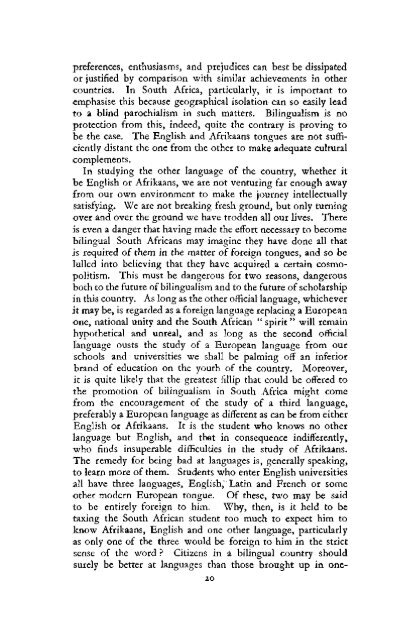Theoria - DISA
Theoria - DISA
Theoria - DISA
Create successful ePaper yourself
Turn your PDF publications into a flip-book with our unique Google optimized e-Paper software.
preferences, enthusiasms, and prejudices can best be dissipated<br />
or justified by comparison with similar achievements in other<br />
countries. In South Africa, particularly, it is important to<br />
emphasise this because geographical isolation^ can so easily lead<br />
to a blind parochialism in such matters. Bilingualism is no<br />
protection from this, indeed, quite the contrary is proving to<br />
be the case. The English and Afrikaans tongues are not sufficiently<br />
distant the one from the other to make adequate cultural<br />
complements.<br />
In studying the other language of the country, whether it<br />
be English or Afrikaans, we are not venturing far enough away<br />
from our own environment to make the journey intellectually<br />
satisfying. We are not breaking fresh ground, but only turning<br />
over and over the ground we have trodden all our lives. There<br />
is even a danger that having made the effort necessary to become<br />
bilingual South Africans may imagine they have done all that<br />
is required of them in the matter of foreign tongues, and so be<br />
lulled into believing that they have acquired a certain cosmopolitism.<br />
This must be dangerous for two reasons, dangerous<br />
both to the future of bilingualism and to the future of scholarship<br />
in this country. As long as the other official language, whichever<br />
it may be, is regarded as a foreign language replacing a European<br />
one, national unity and the South African " spirit" will remain<br />
hypothetical and unreal, and as long as the second official<br />
language ousts the study of a European language from our<br />
schools and universities we shall be palming off an inferior<br />
brand of education on the youth of the country. Moreover,<br />
it is quite likely that the greatest fillip that could be offered to<br />
the promotion of bilingualism in South Africa might come<br />
from the encouragement of the study of a third language,<br />
preferably a European language as different as can be from either<br />
English or Afrikaans. It is the student who knows no other<br />
language but English, and that in consequence indifferently,<br />
who finds insuperable difficulties in the study of Afrikaans.<br />
The remedy for being bad at languages is, generally speaking,<br />
to learn more of them. Students who enter English universities<br />
all have three languages, English," Latin and French or some<br />
other modern European tongue. Of these, two may be said<br />
to be entirely foreign to him. Why, then, is it held to be<br />
taxing the South African student too much to expect him to<br />
know Afrikaans, English and one other language, particularly<br />
as only one of the three would be foreign to him in the strict<br />
sense of the word ? Citizens in a bilingual country should<br />
surely be better at languages than those brought up in one-<br />
20
















